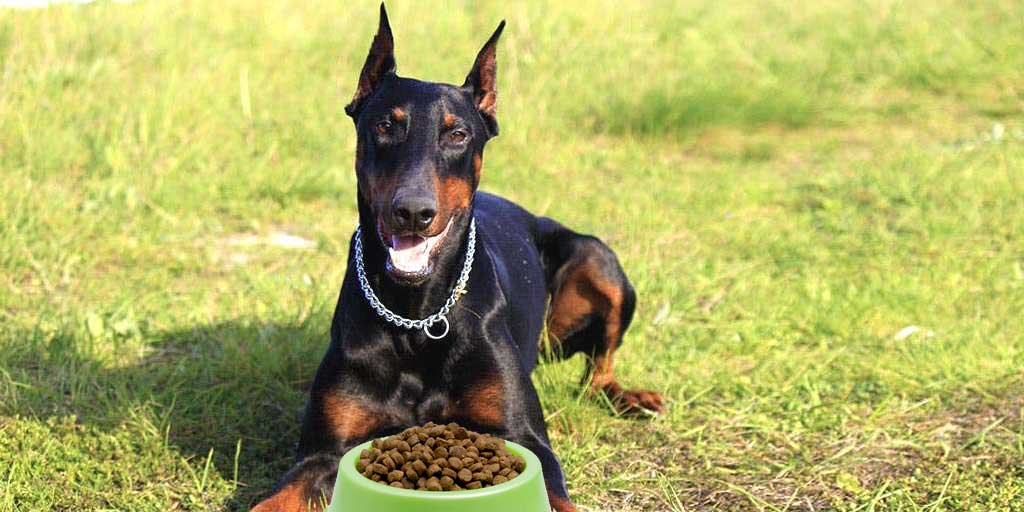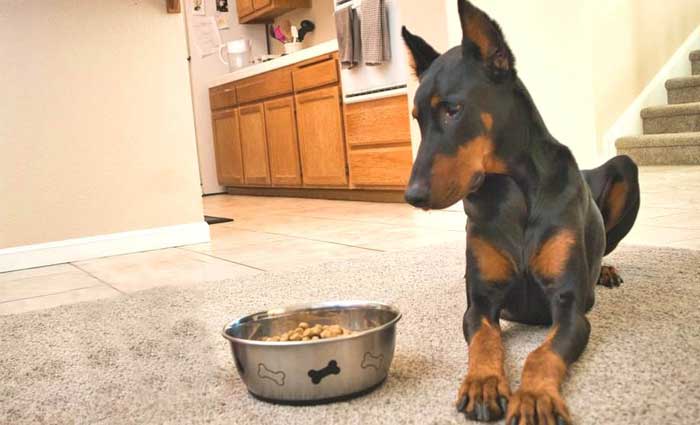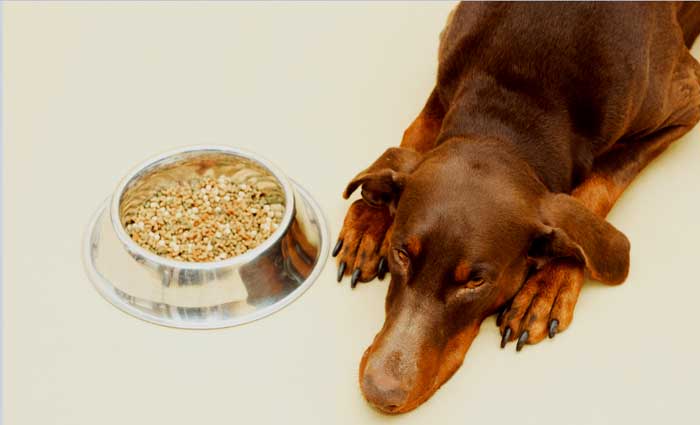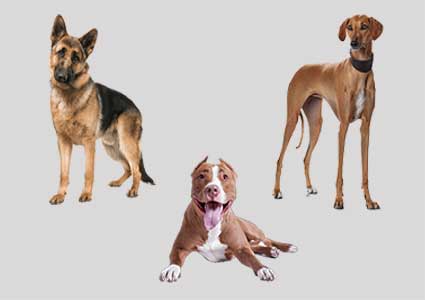
Dobermans have unique dietary requirements because of their muscular body and active lifestyle. After exploring a variety of leading dog foods offered by major brands, we recommend Wellness Complete Health Whitefish Dog Food as the best dog food for Dobermans. This kibble has majority of the proteins, healthy fats, calories, and micro-nutrients required in the daily diet of an agile breed like your Doberman Pinscher.
Best Dog Food For Adult Dobermans - Our Top Pick
Wellness Complete Health Whitefish Dog Food
Loaded with high-density proteins and probiotics, this scientifically blended formulation is suitable for an adult Doberman to maintain a strong physique. The grain-free recipe provides the bulk of its lean protein from whitefish meat. Fruits added in this kibble offer key vitamins and antioxidants required by your pooch.
Packed with over 26% protein and 12% healthy fats, Wellness Complete Health Grain-Free dog food contains real whitefish meat as the number one source of protein.
It delivers essential omega fats from menhaden fish meal, which improves your canine’s fur and boosts immune system health.
Spinach, apples, and blueberries included in this recipe provide antioxidants that improve your pooch’s heart health and lowers the risk of cancer.
Calcium, phosphorus, and vitamins added in this formula strengthen your dog’s bones. It also contains glucosamine and chondroitin, which is critical for maintaining healthy joints in large breed dogs like your Doberman.
Why We Like It
- High-protein, moderate-fat recipe suited for a muscular dog like your Doberman
- Delivers antioxidants to improve disease resistance
- Contains glucosamine and chondroitin for healthy joints
- High-calorie formula specially crafted for active dog breeds
- Healthy bacteria included to support digestion
- No meat by-products, artificial flavors, colors or preservatives
Best Priced Dog Food For Adult Dobermans
Iams Large Breed Adult Dry Dog Food
This nutrient-dense formula is full of high-quality protein. It provides Omega-3 fatty acids that are essential for developing a gleaming hair coat. Phosphorus and calcium present in this kibble boost your canine’s bone health.
Containing real chicken as the main ingredient, this dog food has the ideal protein content for the development and maintenance of lean muscles.
Complex carbohydrates provided by whole grains like barley and sorghum in this formula will fuel all the energy needs of your active Doberman.
Dried beet pulp in this recipe provides digestive fiber, which supports your pooch’s intestinal health.
Antioxidants provided by flaxseed improve heart health and boost the immunity of your Doberman.
It is also fortified with essential vitamins and minerals that promote your dog’s overall health.
Why We Like It
- High-calorie design best for active dog breeds like your Doberman
- Meat-based protein provided by chicken boosts lean muscles
- Balanced nutrient recipe suitable for large breeds
- Contains generous fiber content to support healthy digestion
- Delivers low-glycemic carbs that release energy steadily
- Has no anonymous meat ingredients
Best Dog Food For Doberman Puppies
Solid Gold Natural Large Breed Puppy Food
This protein-dense recipe has the perfect blend of nutrients required by your Doberman puppy. The grain-inclusive kibble draws the majority of its proteins from real Bison meat. Enhanced with superfoods like cranberries and broccoli, this novel formulation provides vital antioxidants and healthy fats to your pooch.
Solid Gold Natural Large Breed Puppy Food delivers high-quality proteins from real Bison meat. Its balanced amino acid profile boosts the development of lean muscles in your growing puppy.
Brown Rice, Oatmeal, and Pearled Barley contained in this formula provide healthy carbohydrates that will fuel your active Doberman pup. They also deliver vital digestive fiber that boosts your pooch’s intestinal health.
Ocean fish meal and salmon oil present in this dog food provide essential omega fats that give your pup a healthy and shiny fur coat.
Superfoods like parsley, apples, cranberries, broccoli, and spearmint added in this recipe supply antioxidants and pre-biotics that boost your pup’s immune system and overall health.
Why We Like It
- Every cup contains 26% protein and 380 calories ideal for a Doberman pup
- Delivers omega fatty acids that promote healthy skin
- Includes fiber-rich fruits that promote gut health
- Provides EPA and DHA that supports eye and brain development
- Has calcium and phosphorus for improved bone health
- Contains chelated minerals like zinc proteinate for better nutrient absorption
Best Dog Food For Senior Dobermans
VICTOR Senior Healthy Weight Dry Dog Food
Filled with proteins and probiotics, this kibble has the recommended combination of nutrients vital for a senior Doberman to maintain a healthy body. Real beef is the number one source of protein in this recipe. It is also rich in dietary fiber that promotes intestinal health of your mature canine.
With over 27% protein, this formula is ideal for senior Dobermans who need more protein to maintain their muscle mass. This high-protein, moderate-fat recipe is suitable for aging canines that are becoming less active.
Flaxseed present in this recipe delivers vital omega-3 and omega-6 fatty acids needed for maintaining a healthy fur coat.
This formula also provides Glucosamine and Chondroitin that are very critical for maintaining healthy joints in aging large-breed dogs like your Doberman.
Alfalfa contained in this dog food provides calcium, magnesium, potassium, vitamins B12, C, D, and many other vital nutrients essential for a senior pooch.
Why We Like It
- Balanced nutrient formula suitable for senior Dobermans
- Includes glucosamine and chondroitin for improved joint health
- Generous quantity of meat-based protein boosts muscle health
- Specially formulated with allergy-free ingredients
- Contains Selenium that improves immune system
- No corn, wheat or soy
Your Doberman Is A Fearless Guardian!
Doberman pinscher is a medium-large sized dog breed that is muscular, athletic, and fearless. You can easily identify them because of their slender physique and deep chest. They have a lifespan of up to 13 years and can weigh up to 100 pounds.
Their name comes from the German tax collector Louis Dobermann who specifically bred this dog in the late 1800s. His goal was to create a breed that was graceful, intelligent, and protective.
Doberman is originally a working-dog that served in military and police K9 units to help in search and rescue missions. They are also excellent watchdogs with very high intelligence. This intensely loyal dog breed will fiercely protect his territory and his owner.
In the hands of a good trainer, a Doberman pinscher can quickly be trained to become obedient, affectionate, and people-loving.
Even though this breed evolved as an energetic guard-dog that protects his owner fiercely, it can still be a charming family companion. Dobermans can be great with children if they are raised alongside the child.
As your Doberman is muscular, athletic, and highly active, he needs foods that are high in calories.
A high-protein, moderate-fat diet is ideal for your pooch to maintain his muscular body and fuel his highly active lifestyle.
What Is The Best Way To Feed A Doberman?
Each canine breed has specific dietary needs. As Dobermans are a moderately large breed that is highly energetic and athletic, they have a fast metabolism.
Let us now go over the exact nutritional needs of this agile pooch.
How Much Food Does A Doberman Need Daily?
An average adult Doberman weighing less than 80 pounds will need 2 to 3 cups of food daily. Large-sized, adults that are 90 pounds or more need 3 to 5 cups of food every day.
The quantity of dog food needed will vary based on its quality. A low-quality food with a lot of filler content will need to be fed in higher quantities than high-quality food with less filler content.
Your pooch’s daily calorie necessities will also change depending on his age, activity level, and health.
Here is the approximate daily calorie requirement for Dobermans.
Puppies: 1800 calories
Adults: 2100 calories
Seniors: 1400 calories
These figures are only approximate and can differ depending on your canine’s size and health.
For example, if your pooch just lies around all day and gets little exercise, then he may need lesser calories.
A very active Dobe working as a service dog may need even 3000 calories per day to fuel his intensive daily routine.
How Many Times Should You Feed A Doberman In A Day?
Doberman puppies younger than eight weeks should be fed 4 to 5 times a day.
Once they are older than eight weeks, you can split their food into 2 or 3 meals per day.
For a Doberman older than 7 years, two meals a day is usually sufficient.
What Foods Should A Doberman Eat?

Dobermans are omnivores and can eat several types of meats, eggs, grains, and plant-based foods.
Individual dogs may have a preference for certain foods, but all Doberman have similar dietary requirements.
Let us now look at how much proteins, carbs, and fats your Doberman needs every day based on AAFCO recommendations.
What Nutrients Does your Doberman Need Daily?
Adult Doberman
Minimum: 18% proteins and 6% fats
Ideal: 26% proteins and 12% fats
Doberman Puppies
Minimum: 22% proteins and 8% fats
Ideal: 28% proteins and 15% fats
Doberman Pinscher Feeding Guide
An ideal dog food for your Doberman should contain the following ingredients.
Proteins
Whole meat must be the major source of protein in your canine’s diet. Be cautious of dog foods that have meat meals, as these are usually just filler content.
Grass-fed lamb or beef is an ideal source of protein. It can be enhanced by adding meat from poultry like chicken or turkey and meat from freshwater fishes.
Both pups and adult Dobermans require a large amount of protein to build and maintain their lean muscles.
Healthy Fats
As Doberman is a highly-active and agile breed, a considerable amount of healthy fats is required for your pooch to fuel his daily energy needs.
This breed also needs more fat than other breeds because of their short fur. A lack of fat can cause your dog’s skin to become dry and itchy.
Adding foods that contain omega-3 and omega-6 fatty acids in your canine’s meals will ensure he maintains a shiny fur coat.
Oil from fishes like salmon is the best source of these fats. Fats from beef, chicken, or even from plant sources like coconut oil and flaxseed oil can all be added to your pooch’s diet to meet his daily nutritional needs.
These healthy fats also improve heart health and support your Dobe’s blood circulation.
Carbohydrates
Carbohydrates are essential in your dog’s daily diet because they are the best source of energy. They also contain the dietary fiber needed to maintain optimum digestive health.
At least 25% of your pooch’s meals must consist of foods with complex carbohydrates.
Dobermans have high-risk of developing a disease known as hypoglycemia. This problem is caused by low amounts of sugar in the blood, and it can cause diabetes.
Serving your pooch whole grains with complex carbohydrates like oatmeal, brown rice, and barley is a great way to prevent hypoglycemia. As these foods break down slowly, they steadily release glucose into your dog’s bloodstream. This provides a steady supply of energy and prevents any dangerous, sudden spikes or falls in your Doberman’s blood sugar levels.
Fish
Fishes are not only a great source of healthy omega fatty acids and high-quality proteins but also contain many other vital nutrients.
Fish meat provides several essential minerals like magnesium, iodine, potassium, iron, and zinc. It is also rich in calcium and phosphorus, which are critical for supporting the health of your pooch’s bones and joints.
Make sure to add fish at least once every week to your canine’s diet.
Fruits and vegetables
Veggies and fruits don’t just make tasty dog treats, they also contain several essential nutrients needed for your Doberman’s health.
Antioxidants present in fruits like blueberries and apples can decrease the risk of cancer, diabetes, and heart disease.
Vegetables like carrots, broccoli, and spinach provide dietary fiber needed for digestive health. They also supply vitamins A, B, C, D, E, and K that are vital for your Doberman’s overall well-being.
What Should Dobermans Never Eat?

To keep your Doberman at peak health, it is critical that you keep certain foods out of his diet. These foods carry various risks and can cause long-term damage to your canine’s body.
Corn, Wheat, and Soy
Several dog food manufacturers use corn, wheat, and soy as bulking ingredients because they are a low-cost source of proteins. But all three of these can be unhealthy and sometimes even dangerous for your pooch.
One main reason is that Dobermans are susceptible to hypothyroidism. Corn, wheat and soy can all increase the risk of hypothyroidism.
These foods can also trigger allergies or may be difficult for your canine to digest. They can trigger gastrointestinal problems and also increase the chances of gas buildup in your pup’s intestines. This can lead to a deadly condition known as bloating.
Meat by-products
Meat by-products include brains, intestines, liver, feet, and basically, any remains from a slaughtered animal. It is used by several dog food companies as filler content.
They are not always bad for your pooch, but it is best to avoid them as much as possible. This is because the way these products are sourced, refrigerated, and processed can greatly affect the quality of nutrition they provide.
Usually, there is no way to trace back the source of a generic meat meal, and they might contain questionable ingredients. These meat by-products are more common in cheaper dog foods. It is better to spend a little more and get a higher-end dog food that lists the exact nature of all its ingredients on the label.
Artificial preservatives, flavors, and colors
There are many artificial preservatives that have known health-risks for your Doberman. Preservatives like BHA, BHT, and Ethoxyquin can cause damage to your canine’s stomach, immune system and even increase the risk of cancer. Unfortunately, these are still used in some commercial dog foods. So watch out for them.
Artificial flavors and colors are sometimes used to make the dog food more delicious to your Doberman. But many of these can cause digestive issues in your pooch. It is best to only feed wholesome and natural foods to your canine.
Rendered fat
While healthy fats are essential in your canine’s diet, fat trimmings and rendered lard are both unhealthy and dangerous for your precious pup.
This low-quality fat is known to contain heavy concentrations of toxins. This type of fat is also likely to spoil and become rancid quickly, which will lead to the growth of harmful bacteria that can make your pooch really sick when he eats it.
Eating rendered fat can also lead to fat deposits in the pancreas and cause pancreatitis in your Doberman.
Heal Doberman Health Problems With The Proper Diet
Doberman is a highly-active dog breed that is muscular, agile, and requires a lot of daily exercises.
But even with their fit, athletic bodies, they are susceptible to many diseases.
Here are some of the common health problems that can affect your canine and also some ways in which you can manage them, with the correct diet.
Dilated Cardiomyopathy
Dilated Cardiomyopathy or DCM is a heart disease that makes the heart muscles thinner and causes the heart to increase in size. This transformation gradually weakens the heart’s capacity to pump blood, and eventually causes heart failure.
Symptoms of this disease include fatigue, fainting, and shortness of breath.
Although the exact cause of this disease is still unknown, people have often blamed plant-extracts used in grain-free dog foods as a possible culprit.
It is recommended to include heart-friendly foods in your Doberman’s diet to support his cardiac health.
Coenzyme Q10
Coenzyme Q10 (CoQ10) is the name of an antioxidant which can be very beneficial for dogs with high-risk of DCM. Foods that are rich in CoQ10 include strawberries, cauliflower, spinach, and fatty fishes like trout and mackerel.
Omega 3 and Omega 6 Fatty Acids
Omega fatty acids are known to decrease the risk of heart diseases in both humans and dogs. Fishes like salmon, herring, and cod contain a lot of these vital nutrients. Plant sources like chia and flax seeds are also rich in these heart-healthy fats.
Wobbler’s Syndrome
Cervical Vertebral Instability or Wobbler’s Syndrome is a disease caused by the gradual deterioration of the cervical vertebrae in the neck region. It causes compression of spinal nerves in the neck region, which can lead to neck pain, weakening of hind legs, and wobbly gait.
Doberman pinchers have a high risk of developing this condition by the time they reach 3 years of age.
Although there is no cure for this disease, you can help your dog develop strong joints by feeding him dog foods fortified with glucosamine.
Calcium-rich foods like eggs and trout should be fed regularly to promote strong bone development.
Hypothyroidism
Large breed dogs like your Doberman are susceptible to developing hypothyroidism.
This disorder is caused when your dog’s thyroid gland doesn’t produce enough hormones.
Common symptoms include dry skin, lethargy, cold sensitivity, and hair loss.
Add foods rich in iodine to your Dobe’s diet to help support his thyroid gland and prevent this illness. Kelp and shrimp are great sources of natural iodine and can be added to your canine’s meals at least once a week.
Osteoarthritis and Hip Dysplasia
Big dogs like Dobermans are prone to experience bone and joint-related illnesses as they age. The most common ones are Arthritis and Hip Dysplasia.
Arthritis can cause your dog to limp or walk stiffly. It is usually caused by the breakdown of cartilage in the joints.
Hip Dysplasia is caused by the deterioration of the ball and socket joint in your pooch’s hip. This illness can make your dog’s hind legs lame and cause pain when getting up after lying down.
Choose a dog food that is enriched with chondroitin and glucosamine. These compounds help to build strong joints and have anti-inflammatory properties that can ease the pain of joint diseases.
Providing foods rich in omega 3 fatty acids like flaxseed and chia seeds will also help support your dog’s joint health.


